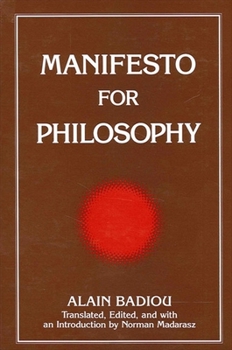Manifesto for Philosophy
(Part of the SUNY Series: Intersections: Philosophy and Critical Theory Series)
Select Format
Select Condition 
Book Overview
Contra those proclaiming the end of philosophy, Badiou aims to restore philosophical thought to the complete space of the truths that condition it.
Format:Paperback
Language:English
ISBN:0791442209
ISBN13:9780791442203
Release Date:June 1999
Publisher:State University of New York Press
Length:188 Pages
Weight:0.75 lbs.
Dimensions:0.5" x 6.0" x 9.0"
Customer Reviews
1 rating
Philosophy or Sophistry?
Published by Thriftbooks.com User , 24 years ago
If anything, Badiou's book poses a serious challenge to the dominance of Heidegger in continental philosophy today. Philosophy can never announce its own end, the end of philosophy. Neither can philosophy pretend to lose itself in the linguistic turn, in the shift from logic and reason to poetry. Philosophy, Badiou argues, must be distinguished from sophistry. Just as Plato founded philosophy from the thralls of sophism of his age, we too must recapture the 'Platonism' of philosophy in an age of anti-Platonism. Badiou's middle course between Plato, on one hand, and the likes of Heidegger and Deleuze, on the other hand, proposes the ideal of philosophy that is not-yet and, more importantly, not reducible to extreme conclusions, i.e., the rejection of philosophy as a dead endeavor. Philosophy is not the antithesis of sophism, and in this the true opposed to the false, but Badiou contends that sophism is a necessary partner of philosophy. In this schema, philosophy must be distinguished from sophism; that is, we must uphold a conception of truth, or rather, of truths. Philosophy seeks the truth in the plural, truth as multiple but which is nevertheless truth and not relative 'truth.' In 'Manifesto,' Badiou engages with the dominant currents of philosophy today in order to reimagine the possibility of philosophy despite the skeptics. In the anglo-american vs. continental split in contemporary philosophy, one is often left to choose two impossible alternatives: logic or poetry. In 'Manifesto' Badiou opens up another way, a way that is a return to that which has always been with us all along.






